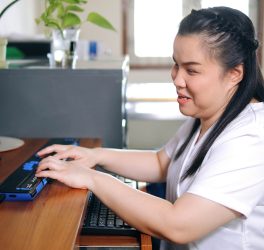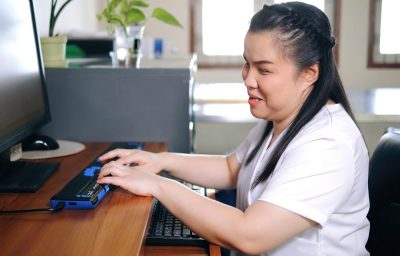
Penn State Lehigh Valley’s (PSU-LV) Life Education and Occupational Studies (LEOS) post-secondary program for students with intellectual disabilities will begin on campus this fall.
Modeled after the WorkLink Program at University Park and the Career Studies Program at Penn State Harrisburg, this is the first year for the LEOS program at PSU-LV. “Penn State is committed to serving students with intellectual disabilities and hopes to grow its post-secondary programs to be accessible statewide,” said Nicole Moschberger, education program specialist at PSU-LV.
LEOS, a two-year program, focuses on providing participating students with academic enrichment, enhanced socialization, increased independent living skills, and the attainment of competitive, long-term employment opportunities.
During the first year, students focus on developing a person-centered plan that includes their interests and career goals. “During the second year, students will participate in some job shadowing and internship opportunities with employers who have committed to hire individuals with disabilities,” Moschberger said. “We will try to match the students with employers in their field of interest and place them in several different opportunities to help the student decide which potential paths fit best.”
Jessica Cole, special education teacher in a behavior support classroom at Easton Area School District, initiated the LEOS program at PSU-LV. “She came to our continuing education department and asked if Penn State would consider offering a post-secondary program to students with intellectual disabilities,” Moschberger said. (Cole will work with the students on a one-on-one basis to develop their respective academic plan. Moschberger will be working directly with the students, as well.) The continuing education team then pursued and received an exploratory grant from the Dreams Realized through Education Aspiration Model Partnership (D.R.E.A.M.), a group formed by parents and professional who have extensive knowledge related to students with intellectual disabilities and postsecondary education. COVID hit and slowed the entire process, but despite the challenges of the pandemic, funding was secured and the LEOS program will start with its first two students from PSU-LV this fall.
Moschberger said she anticipates no more than five LEOS students per semester so each can receive the customized support they need. The students will audit one or two credited courses with the support of peer mentors and an educational support coordinator and will participate in a noncredit seminar program that focuses on independent living, employability, and life skills training three days a week. “The courses the students audit will be determined by the student and the community that supports them,” said Moschberger. “The end goal for these students with intellectual disabilities or on the autism spectrum will be to obtain and sustain competitive employment.”
LEOS and programs like it are incredibly important for advancing the university’s commitment to diversity by approaching it from a different angle, Moschberger said. “This is a population of students that is traditionally underserved in higher education. Students receive support throughout their grade school education, and at the end of twelfth grade, there is little to no additional support [on a post-secondary level] to help them decide what to do.”
The LEOS program helps participants set up different career paths by setting up a plan to receive employment, then builds the skills required. It also gives all students the opportunity to learn with and from each other. “This program gives our LEOS students the chance to participate in the college environment, like campus activities and everything our traditional students have access to,” said Moschberger. “It also provides our traditional students with opportunities to be leaders on campus. It’s an opportunity to advocate for disability rights — by gaining firsthand experience supporting people with disabilities. It’s an important part of the college experience—for students to learn from those different than they are,” Moschberger said.
For more information, contact Moschberger at 610-285-5239 or nrm157@psu.edu.








